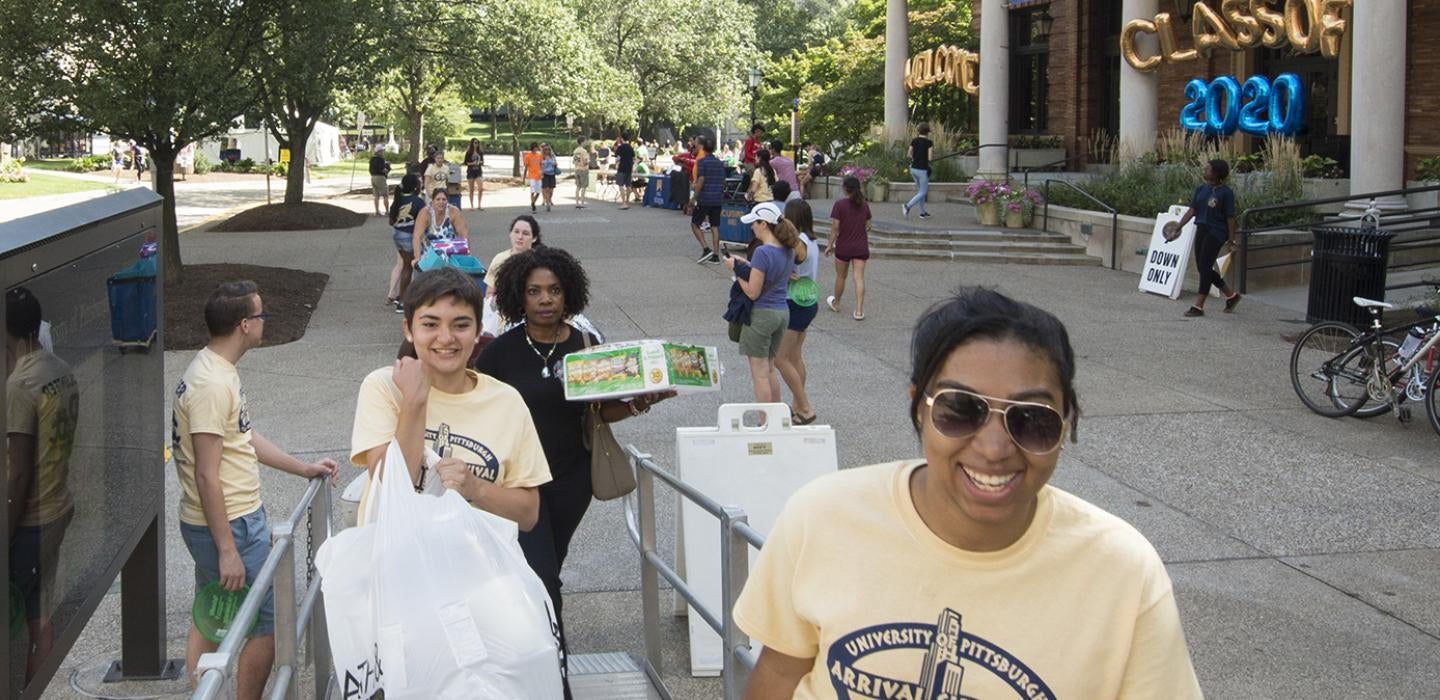
Subscribe to Pittwire Today
Get the most interesting and important stories from the University of Pittsburgh.Lauren Nath and Alec Loyd understand what moving into a Pitt residence hall can be like for an incoming freshman.
Nath, a senior studying materials science and engineering, remembers arriving as a freshman at Forbes Hall, where volunteers transferred her belongings from her family’s vehicle to her room in less than an hour. Loyd, whose family had to drive for more than nine hours from St. Louis, Missouri, had a similarly efficient experience when he moved into Mark A. Nordenberg Hall.
Nath and Loyd saw their moving experiences come full circle. They served as volunteers, distributing parking passes to families during a downpour and witnessing roommates meeting for the first time.
Now a junior economics major, Loyd has joined Nath as a coordinator of Arrival Survival, Pitt’s annual move-in program overseen by Panther Central, the University’s hub for dining, housing and transportation. The program, which will take place Aug. 21-25, 2017, is executed in partnership with multiple divisions, such as the Office of Community and Governmental Relations, the Pitt Alumni Association and Pitt Athletics.
“I think it’s incredible how the entire University comes together for Arrival. Students, faculty and staff work together to help make every freshman’s and upperclassman’s move-in as smooth as possible,” said Nath, who is in her second year as a coordinator for the program.
“Hundreds of people move in thousands of students, and, thanks to them, everyone has fun during one of the most stressing times of the year. Arrival Survival helps introduce the ‘home-away-from-home’ feeling that the University of Pittsburgh strives to achieve with its students,” she added.
Nath and Loyd are supervising the efforts of 520 volunteers, 105 supervisors and 14 assistant coordinators, who will be positioned at move-in cart stations scattered across campus. The Arrival Survival staff expects to help 7,439 students move into Pitt’s 21 residence halls and apartment-style accommodations. Slightly more than 3,800 of that total are freshmen.
Survival toolkit
- Parking pass: Park outside of your residence hall or apartment-style accommodations for one hour by displaying a parking pass, which can be found in your my.pitt.edu inbox. After you unload your belongings, the pass will give you access to long-term parking for the rest of the day.
- Move-in cart: Rather than having a parent dripping with sweat under the weight of a minifridge or a sibling dropping your new television, retrieve a move-in cart from one of 12 stations situated near the unloading zones. Arrival Survival volunteers will also be available to help to move your items into your new living quarters.
- Food: The Arrival Survival team will provide free pizza Tuesday and Wednesday and free ice cream, Gatorade, soft drinks and water during the entire Arrival Survival period at the Schenley Quadrangle.
Visit arrival.pitt.edu for customized move-in instructions and a map of long-term parking locations.
Survival tips
Prior to their arrival, students should look at their notice-of-housing-assignment email for their assigned move-in date and time. Nath recommends that students confirm where their designated unloading zone is. Family and friends are required to wear wristbands specific to their students’ campus housing; the proper wristbands can only be obtained by reporting to the correct unloading zone.
Follow Arrival Survival on Facebook and Twitter for updates throughout the week.


